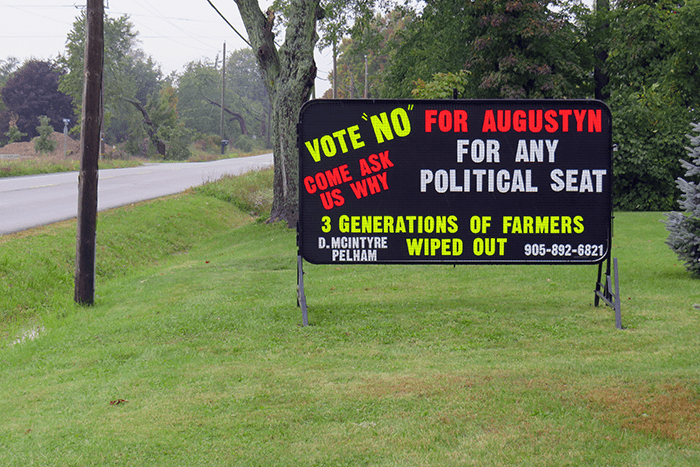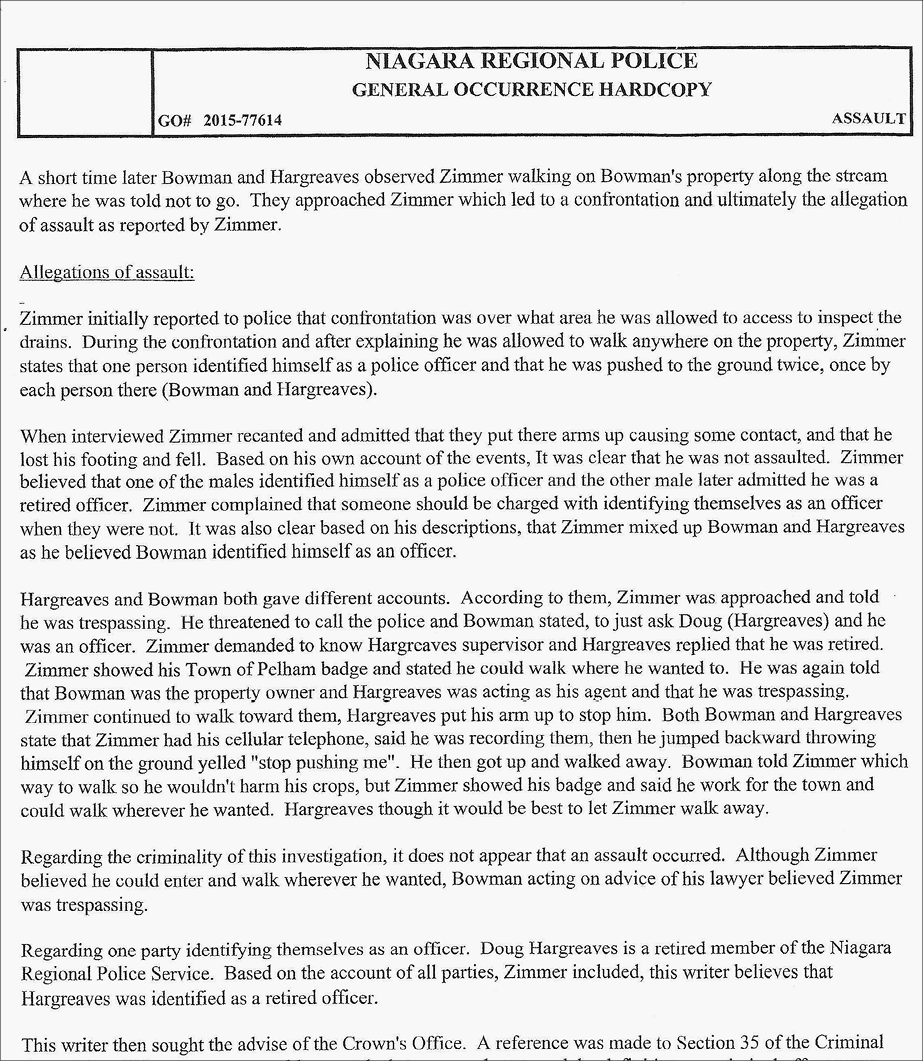A portable sign parked off Canboro Road may turn out to be this election’s most memorable message
BY SAMUEL PICCOLO and DAVE BURKET The VOICE
Conflicts over real estate development in rural communities and the consequences of urban sprawl—intended and unintended—are nothing new. But one dispute may hold the record for the longest modern legal battle between residents of Pelham and their Town Hall. The story involves destroyed farmland, death and illness, a bizarre incident of alleged faked assault on a Town employee, a very visible road sign lambasting the town’s mayor, and a potential million-dollar-plus liability for the municipality—a liability for which its taxpayers are ultimately on the hook.

After over two decades of legal wrangling, the resolution of an ongoing lawsuit between the Town of Pelham and two Fenwick residents that was supposed to end last spring has been pushed back by another year.
The two residents, neighbours Doug Hargreaves and Donna McIntyre, each own land on Canboro Road. Their complaint stems back to the 1990s and the construction of the Cherry Ridge subdivision.
Hargreaves lived at his property at the time, while McIntyre’s property was owned by an uncle of her husband, Ted Bowman. Bowman’s uncle, Rod, died a number of years ago. Bowman, 61, suffered a stroke last year and is now partially paralyzed.
The basis of the residents’ complaint is that the Town deliberately diverted water from a storm water pond into a natural stream that runs through their property, and did so because the volume was too great for the municipal drain.
According to McIntyre and Hargreaves, the massive increase in water flow resulted in erosion and a lowering of the water table, decimating parts of their properties, leading directly to the loss of seven acres of peach trees and causing other damage.
Early days
“We first started complaining about it in ’94 or ’95,” said Hargreaves. “Back then it was basically a matter of, ‘Don’t put [the water] into the stream.’”
According to Hargreaves, the Ministry of Environment also requested that the matter be addressed, and the Town promised to take action on the issue.
Prior to its construction, the land on which the Cherry Ridge subdivision was built had directly absorbed the rainwater that fell on it.
Once houses were built and roads were paved, the soil no longer absorbed the water, and the runoff was redirected into a storm water pond built for the purpose. Its capacity was inadequate, said Hargreaves.
“[The Town] just ignored everything for probably two years. Letters, requests,” he said. “Eventually we got a drainage lawyer involved. I’m guessing that was around 2000. It was so long ago.”
Part of the delay, Hargreaves said, was down to the number of lawyers involved.
“The first one, he [left to work for] the drainage board, so it was a conflict,” he said. “We got a new lawyer. He got started on the case, and then he said, ‘The way things are going with the Town, I’m retiring in a few years. There’s no way I can pursue this. It’s going to take years.’ So we have [another] new lawyer.”
The intervening years have been full of hearings, discovery interviews, and proposals.
“There was one hearing about three years ago with three or four proposals—things that had to be clarified. The Town fought them all, and they lost every one,” said Hargreaves.
“One was for increasing the damages. The Town wanted to let some of the developers off the hook. The judge told them, ‘Well, that’s nice of you, but what if the Town can’t afford to fix the damages? We can’t let these other people off the hook yet.’”
“We had fifty percent of the population of cucumber magnolia trees in Canada, and they’re mostly dead,” said McIntyre, referring to the endangered tree species that grows only in Carolinian Forest.
“Our peaches are gone—not only the trees, but the income from the trees.”
Essentially, McIntyre and Hargreaves argue, the periodic influxes of water from the storm water pond have greatly eroded the natural stream, deepening it significantly. Third-party monitoring equipment set up between September 2016 and October 2017 to measure water flow detected 100 times more force than what would be normal for the site, according to McIntyre, who adds that the force was so great that it broke the measuring devices.
“The company said they’d never had that happen before, equipment damaged like that.”
The force of the flow has cut what’s effectively a shallow canyon across the landscape, the bottom of which sits below the natural water table, leaving moisture beyond the reach of tree roots, causing orchards and other vegetation to starve for water until dying.
A 2011 study by Anne Yagi, of the Ministry of Natural Resources, found that the stream bed had been eroded. In her report, Yagi wrote that the wetland plants were stressed and “attempting to adapt to these lower water levels.”
Though Yagi did not directly assess the storm water, she said, “If additional storm water has been added, it should be suitably mitigated from an ecological standpoint.”
The new mayor: David Augustyn
After years of stagnation with the lawsuit, McIntyre initially welcomed the election of David Augustyn as mayor of Pelham in 2006.
McIntyre, who is 55, and retained her maiden name after marrying Ted Bowman, is Clinical Manager at Douglas Memorial Hospital in Ft. Erie. She recalled a visit to her home by the future mayor 12 years ago.
“The Mayor sat in my kitchen when he first campaigned in 2006. He knew what was going on because he and [Ted Bowman’s cousin] had worked together at some point. He sat at my table, drank my tea, and ate my cookies, and said he was going to do everything he could to fix this. He said that this was wrong, that it had to be corrected.”
McIntyre shook her head.
“We voted for him. Absolutely. We thought, ‘Okay, this is a good guy, he’s going to do what he promised.’”

After the election, McIntyre said, Augustyn failed to follow through on his pledge to help.
“There was just nothing, nothing, nothing. Ted and I met with him about five years ago, just to say, ‘You know, Dave, you said you supported us and you were going to fix this.’ He was sitting at his desk in his office, and [CAO] Darren Ottaway was standing at his left shoulder. Every time we would ask him a question, Ottaway would say, ‘You can’t answer that.’ I got up and left. I said, ‘This is just a waste of my time. I can’t believe what’s going on here.’ Ted stayed for a few more minutes, but nothing. We couldn’t discuss anything with him because Ottaway wouldn’t let him answer questions.”
Pelham's Public Relations and Marketing Specialist Marc MacDonald confirms that the CAO's advice to the Mayor was "not to discuss an issue in active litigation," but asserts that there is a "major discrepancy" regarding the CAO's physical proximity to the Mayor.“The best part is that we were at one of those Regional Council meetings. Ted was in his wheelchair, and I took him over to say hi to Dave. Dave said, ‘Oh, hi, Ms. McIntyre,’ and then he looked at Ted and said, ‘And who might you be now?’ He pretended in front of his group that he didn't know Ted. Ted’s lost a lot of weight, but he’s still Ted. And he was with me, and Dave knew who I was. He’s known Ted for years. He knew Ted had a stroke. It’s a small town—he lives ten doors down from us. I thought, ‘Okay, buddy.’”
Augustyn recalls the meeting this past February differently, asserting that it was McIntyre who invited him to say hello to Bowman.
“I finished my conversation, turned, went to him and said ‘Hello Ted. I heard you had a stroke. How are you doing?’”
McIntyre, according to Augustyn, then stated that he, Augustyn, was responsible for Bowman’s stroke.
McIntyre forcefully disputes the Mayor’s account.
 “That is ridiculous. Augustyn asked me who Ted was. He said nothing about Ted’s stroke. It simply did not happen that way.”
“That is ridiculous. Augustyn asked me who Ted was. He said nothing about Ted’s stroke. It simply did not happen that way.”
In 2015, Augustyn told the Voice that the Town had spent some $200,000 to update the storm water pond, and that the possibility of constructing a municipal drain in the area to meet provincial requirements was also being considered.
This work, McIntyre and Hargreaves say, has not been effective. Their only hope now is to reach a resolution in front of a judge.
“They chose to take us on for some reason, and I don’t know what that reason is,” said McIntyre. I really don’t. So you’re waiting, and hoping that no one else dies, or has a heart attack, or has a stroke.”
The police are called
Although the drainage issue—the initial reason for the lawsuit—still concerns Hargreaves and McIntyre, intervening struggles with the Town have made the situation even more troubling for them.
The two say that the most upsetting incident in the decades-long saga occurred on September 9, 2015, when a Town employee filed a police report against Hargreaves and Bowman alleging assault.
Yet within 24 hours, the employee had recanted his statement.
Earlier that morning, the Town convened a meeting on Maple Street to inform local residents that engineers would be evaluating water drainage on or near their properties.
Among the engineers was John Spriet, of Spriet Associates Ltd. in London. Also present was a representative from the Ministry of Natural Resources, and Pelham’s Drainage Superintendent, Mike Zimmer.
Instead of limiting their survey to the drains, after the meeting Hargreaves said that Zimmer and Spriet began following the natural stream that runs though the area.
“As they were surveying that, Ted called the lawyer in Toronto,” recalled Hargreaves. “The lawyer told Ted that they could only come on his property to survey the drain, not the stream.”
Next, Hargreaves says that he and Bowman went out to Bowman’s property line and waited for Spriet and Zimmer to arrive.
“Ted told them, ‘I’ve talked to my lawyer, and we will take you over to the drain. You can survey that. But you’re not to come on to my property for this stream,’” said Hargreaves.
Hargreaves says that at this, Spriet, the engineer, began packing up his things and withdrew.
“[But] Zimmer was Mr. Mouthpiece, saying that he was the superintendent and he could go wherever he wanted,” said Hargreaves.
“Some time along the way Zimmer disappeared,” said Hargreaves. “We walked back to Ted’s truck and were driving back when we saw Zimmer coming out of the bush on Ted’s property from where the stream was.”
Hargreaves says that he and Bowman confronted Zimmer.
“We knew that his name was Mike, but we didn’t know his last name. We told him he was trespassing, and that he had to leave. He was swearing at us, saying, ‘I don’t give a shit what you say, I can go wherever the fuck I want,’” Then, Hargreaves says, Zimmer pulled out his cellphone.
“He said, ‘I’m recording this.’ Ted and I were standing side-by-side, and Zimmer was maybe eight or ten feet in front of us. I knew from the way things were he wasn’t going to do anything physically,” recalled Hargreaves.
After turning his phone to face himself, Hargreaves says that Zimmer charged at the two of them.
“He stopped about two feet in front of me. Then he looked at me, and boom—he threw himself in the air backwards, landed on the ground, and went, ‘Ahhhhh. You pushed me, don’t push me.’ Ted and I are looking at each other like, ‘I can’t believe this.’”
What Zimmer evidently did not know at the time was that Hargreaves, then retired, had been a police officer for 35 years.
“I’ve been to strike scenes and different things where people do this, and it’s just so unbelievable. A car will drive by and they’ll throw themselves. It was just theatrics on his part,” Hargreaves said.
After Zimmer got up, Hargreaves and Bowman again told him to leave.
“We talked to the lawyers, and we called the police right away, just to let them know what happened. Zimmer went back to the Town and he must have called the police too,” said Hargreaves.
That night, police arrived to speak to Bowman and Hargreaves.
“He cautioned us, he said we weren’t obliged to speak, this is the complaint and the whole bit,” said Hargreaves. “I said, ‘I don’t care about any of that stuff. This is what happened, and you tell the investigator what happened.’”
When the two went to the station the next day, they learned that Zimmer had changed his story.
Zimmer’s statement, a copy of which has been obtained by the Voice, detailed his original allegations.
Zimmer initially alleged that he was pushed to the ground twice, once each by Hargreaves and Bowman.
“When interviewed,” reads the NRP report, “Zimmer recanted and admitted that they put their arms up causing some contact, and that he lost his footing and fell.” The report concluded that Zimmer’s allegations were unfounded.
Hargreaves says that even this statement is false.

“There was no contact,” he said, adding that lying to police and causing them to enter into an investigation is public mischief.
“Probably the reason he wasn’t charged with public mischief, they probably had him almost backed into a corner, but they wanted to leave him an escape route—that’s the way these things work. ‘If you come clean and tell us what actually happened, then we won’t charge you after with public mischief making a false statement.’ When you make a false report and it causes police to enter into an investigation, that’s public mischief. That’s what he did. He committed a crime, but they obviously gave him the out for the rat to crawl out of the corner.”
Zimmer, who is still employed by the Town, did not respond to repeated requests for comment.
Asked whether Zimmer was reprimanded or was subject to any disciplinary measures for making a false statement to police, Public Relations and Marketing Specialist Marc MacDonald initially said that the Town “would be pleased to respond,” but only on condition that the Voice provide the Town with a copy of the police report.
The Voice did so.
A day later, MacDonald replied, “The Town is satisfied with the statements that Mr. Zimmer provided in his report as he recalls the events and has no further comment.”
McIntyre said that the ordeal took an immense toll on her husband, Bowman, who subsequently had a stroke.
“I can’t even tell you how much it affected him,” said McIntyre. “He wouldn’t go to the back of the farm for six months, he was so afraid he was going to meet somebody from the Town, especially with our grandson. He was really, really upset about this whole situation with [Zimmer].”
Both McIntyre and Hargreaves were dismayed by the Town’s lack of response to one of their employees making false allegations to the police.
“With the outcome of this [police] report, he can have no credibility in this town,” said Hargreaves.
“He still works, and he’s still on the Sunshine List at the Town,” said McIntyre, who says that she approached CAO Darren Ottaway about Zimmer late last year.
“I said, ‘What did you do?’ and he said, ‘That’s all been done.’ I said, ‘What did you do about it?’ and he slammed his door in my face.”
Ottaway did not acknowledge repeated requests for comment.
After requesting the date, time and “proof” of the slammed-door incident, Public Relations and Marketing Specialist Marc MacDonald stated that McIntyre’s version of the encounter “does not coincide with the events as recalled by the CAO. In fact, it was the Town’s counsel who closed the door to the CAO/Mayor’s office area.”
McIntyre remains unmoved.
“Darren Ottaway shut that door in my face. The counsel was hiding in the back office. This is what we face. This has all become really personal, and I’m tired of losing family over it, tired of the time, tired of everything. Especially the bullying and the non-disclosure that goes on.”
McIntyre and Hargreaves say they attempted to recover the video made by Zimmer on his Town cellphone through a freedom of information request in 2016, only to be denied. Their appeal to the Information and Privacy Commissioner of Ontario was also denied.
“Ted travelled internationally for work,” said McIntyre. “[Had Zimmer’s allegations resulted in a conviction] his passport would have been gone. Ted’s whole life—he wouldn’t have been able to work—would have been gone. All for this, all for somebody who lies.”
Judge’s recommendation rebuffed
On September 1, 2017, Hargreaves and McIntyre attended a mediation conference at the Welland courthouse with their lawyers, representatives of the Town, and a judge, a meeting they hoped would finally mark the beginning of the end of the lawsuit.
“The judge recommended a solution to us and the Town,” said Hargreaves. “Ottaway was the one there for the Town. They told him to go to the Town Council with the solution. Apparently he didn’t.”
McIntyre concurred with Hargreaves.
“The judge was very clear that [a trial] was going to be very costly and very time-consuming, and that it was probably better that we came up with a conclusion before then.”
The two sides’ lawyers negotiated a tentative dollar-range that would be acceptable to all parties, said McIntyre.

The settlement proposal was to have been presented to Town Council behind closed doors a little over two weeks later, on September 18, 2017.
It was not.
According to minutes of the meeting, no Town legal counsel was present, leaving only CAO Darren Ottaway to speak to the matter.
Despite being instructed by the judge to recommend a settlement, as asserted by the plaintiffs, Ottaway failed to do so.
According to a source with direct knowledge of the closed-door meeting, council was never presented with an offer. “The lawyer wasn’t at the meeting. It was Ottaway who said that there was no deal because there were no worthwhile negotiations, and that he fully expected it would have to go to trial. He didn’t mention anything about the judge’s comments, or any recommendation for a settlement. Nobody questioned him on this. They mistakenly assumed that Darren was telling the truth. He just said they had the pre-trial meeting, that they weren’t close to making a deal, and he fully expected it would go to trial. One councillor asked Darren if he didn’t think he was exposing the Town to a bigger loss in going to trial—wasn’t that kind of a risky thing to do, winner-take-all, as opposed to negotiating? He said that [McIntyre and Hargreaves] didn’t want to negotiate, so we had to go to trial.”
No Town Councillor, nor the Mayor, nor the CAO responded to requests for comment about the closed-door meeting.
Public Relations and Marketing Specialist Marc MacDonald stated, “In the absence of confirmed documentation that the judge directed the CAO to carry out any such orders we cannot comment on the recollection of the plaintiffs. Additionally, any information that may have been presented to Council during an in camera meeting is strictly confidential.”
Failing the pre-trial solution, the case was supposed to go to court this past March.
“Our lawyer was hit by a car,” said Hargreaves. “So we asked for an extension until the fall.”
In response, Hargreaves and McIntyre said that the Town asserted that it would be too busy in the fall, and asked for the case to be pushed back until the spring of 2019.
“They said they would be busy,” said Hargreaves. “They wanted to wait until after the election.”
Former councillor Marvin Junkin, now running for mayor, recalls the lawsuit coming before council.
"This is yet another instance of the Town treating residents as if they don't matter,” said Junkin.

“Endless delays, misdirection, false statements to police—all unacceptable. Solving problems like this isn’t difficult. Tell the truth, admit mistakes, and agree on a repair to the damage. It’s time that Pelham be returned to being run as the small town that it is, not like it’s some Bay Street corporation with teams of lawyers and hidden strategy."
Asked whether the Town was intent on pushing forward to a trial, Public Relations and Marketing Specialist Marc MacDonald replied, “To comment on the Town’s intent regarding any claims made by McIntyre, Bowman, Hargreaves, et al. as it pertains to ongoing litigation would be irresponsible as it pertains to ongoing litigation. It could result in an increased cost to the taxpayer in terms of additional, unnecessary legal fees.”
A message to voters
Last week, McIntyre and Bowman leased a portable sign, erecting it in their front yard at the edge of Canboro Road, careful to follow applicable bylaws on election sign size and placement.
“It’s exactly 3.3 feet from the property line,” said McIntyre, who added that at 8:30 last Monday morning a bylaw officer and representative from the fire department arrived at the house to tell them that the sign was illegal.
“Ted’s caregiver spoke with them,” said McIntyre. “She said they seemed embarrassed.”
In fact, McIntyre is a registered third-party election advertiser in Pelham, a new provincial requirement related to political messaging that came into effect this year. McIntyre requested that the sign be delivered on Monday, September 24, but the contractor delivered it early, on Friday, September 21, before McIntyre had gone into Town Hall to register, something she says she did by 11 AM, leaving her in violation of the new rules over the weekend.
In any event, the sign is getting noticed.
“People honk and wave as they drive past,” said McIntyre.
“It’s been nice to get the support.” ◆


